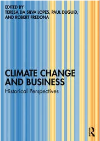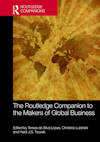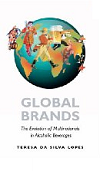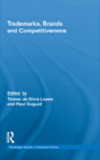Teresa Da Silva Lopes
Professor of International Business and Business History
Visit Teresa Da Silva Lopes's profile on the York Research Database to:
- See a full list of publications
- Browse activities and projects
- Explore connections, collaborators, related work and more
Profile
Biography
Departmental roles
Director of the Centre for the Evolution of Global Business and Institutions (CEGBI)
Featured Work
Climate Change and Business Historical Perspectives
Climate change is the greatest market failure in world history and thus the most urgent challenge in the world of business for the foreseeable future. This book brings together experts to shed light on the historical impact of business on climate change and of climate change on business.
The book shows how corporate responses to climate change emerged out of earlier environmental concerns, regulatory frameworks, and in many cases already established business strategies. Contributors to the book analyse the evolution of business strategies to navigate environmental challenges even before climate crisis was widely recognised as an urgent concern. The historical insights presented by this book will be essential reading for business historians, as well as students, scholars, and reflective practitioners with an interest in the environment, political economy, business strategy, and risk management.
"This thoughtful, stimulating, collection of original papers, written by accomplished business historians, excels in exploring both the impact and responses of business over time to the evolving evidence and proliferating policies on climate change. Here there is a fresh perspective that includes but extends beyond the debates on environmental and fossil fuel programs to encompass agriculture (palm oil), industry (automobiles, alcoholic beverages), insurance, and tourism. The coverage is global, including special chapters on China and India. The result is a rich and ambitious set of contributions that reveals the complex, nuanced reciprocal historical influences of business and climate change."
Mira Wilkins, Professor of Economics Emeritus; Florida International University, USA
"As a scientist and business owner, I have found that for something real and game-changing to be implemented in the climate change sphere, we need businesses to incorporate climate thinking into every area, from production, to human resources, to sales and marketing. This book documents the trajectory of these initiatives in various industries and regions. It is an essential piece of reading for all of us today."
Dr. Laura Catena, Managing Director of Bodega Catena Zapata and founder of the Catena Institute of Wine in Mendoza, Argentina
"This edited volume, by Teresa da Silva Lopes, Paul Duguid, and Robert Fredona investigates the history of one of the biggest problems in the world today, climate change. The collected essays provide a critical perspective on the complex evolution of the problem itself, from nineteenth century awareness of weather changes and pollution hazards to modern efforts to collect data and enact policy changes to curb dependence on fossil fuels. These essays, many of which draw on archival sources, recast traditional histories of economic development by focusing on the consequences of industrial, agricultural, and technological change. They present a complex history of ways that firms have adapted to climate changes in the past and the ways that individual entrepreneurs have sought to abate environmental devastation in their industries. The essays also reveal how the effects of climate change have altered industries such as tourism and insurance and made other industries, such as winemaking, more vulnerable. Together the essays help to tell the multifaceted, non-linear, history that has led to this enormous global challenge."
Walter Friedman, Director of the Business History Initiative at Harvard Business School and co-editor of the journal Business History Review
The Makers of Global Business
.jpg)
The Routledge Companion to the Makers of Global Business draws together a wide array of state-of-the-art research on multinational enterprises. The volume aims to deepen our historical understanding of how firms and entrepreneurs contributed to transformative processes of globalization.
This book explores how global business facilitated the mechanisms of cross-border interactions that affected individuals, organizations, industries, national economies, and international relations. The 37 chapters span the Middle Ages to the present day, analysing the emergence of institutions and actors alongside key contextual factors for global business development. Contributors examine business as a central actor in globalization, covering myriad entrepreneurs, organizational forms and key industrial sectors. Taking a historical view, the chapters highlight the intertwined and evolving nature of economic, political, social, technological and environmental patterns and relationships. They explore dynamic change as well as lasting continuities, both of which often only become visible—and can only be fully understood—when analysed in the long run.
CORDIS website
LSE Business Review
'Using third-party endorsements to build a brand's reputation: the case of British chocolate'
Research
Overview
Main research interests:
International business history, international business, international marketing and strategy, entrepreneurship and innovation, globalisation, growth and survival of firms, climate change and risk in international business.
Additional Topics:
Brands and branding, intellectual property rights, consumer goods, corporate strategy, evolution of industries, fair trade, foreign direct investment, governance, heritage studies, joint ventures, mergers and acquisitions, mobility, multinational enterprises, networks.
Publications
Full publications list
Books - Monographs
- da Silva Lopes, Teresa (2007) Global Brands: The Evolution of Multinationals in the Alcoholic Drinks Industry, New York: Cambridge University Press, pp. 303.
- da Silva Lopes, Teresa (1999), Internacionalização e Concentração no Vinho do Porto, 1945-1995, Porto: GEHVID/ICEP, pp.171.
Edited Books and Special issues
- da Silva Lopes, Teresa, P. Duguid and R. Fredona (eds.) (2025), Climate Change and Business: A Historical Perspective, London: Routledge, pp.326.
- Fredona, Robert, da Silva Lopes, Teresa, and Reinert, Sophous. ‘Forms of Capitalism’ Business History Review, Special Issue - Summer 2024.
- da Silva Lopes, Teresa , Christina Lubinski, and Heidi Tworek (eds.) (2019), Routledge Handbook on the Makers of Global Business, London: Routledge, pp.598.
- da Silva Lopes, Teresa , and Paul Duguid (eds.) (2010), Trademarks, Brands and Competitiveness, London: Routledge, pp. 248.
Refereed Journal Articles - Published
- Amdam, Rolv Petter, Teresa da Silva Lopes, Trudi Herydotter, and Maria E. Mata (2025), ‘The Impact of Deglobalisation and Trade Wars on Industry Dynamics: Norwegian Salted and Dried Cod Fish and Portuguese Port Wine, 1920s-1930s’, Journal of Management Studies (November), https://onlinelibrary.wiley.com/doi/10.1111/joms.70026
- Jones, Geoffrey G., Teresa da Silva Lopes, Pavida Pananond, Rob van Tulder, Noemi Sinkovics, and Rudolf R. Sinkovics (2025), "Transitioning from responsible and reactive to deeply responsible and proactive international business," Critical Perspectives on International Business, 21 (2), 196-225. https://doi.org/10.
1108/cpoib-08-2024-0092 -
Camara, Benedita, Teresa da Silva Lopes, and Fredona, Robert (2024), ‘A Mercantilist Brand: The British East India Company and Madeira Wine, 1756-1834’, Business History Review (Spring), 98 (1), 81-118.doi:10.1017/S0007680523000387
-
Fredona, Robert, Reinert, Sophus A., and da Silva Lopes, Teresa (2024), ‘Forms of Capitalism’ (Spring) 98 (1) , 3 - 35
- da Silva Lopes, Teresa, Dourado, Bruna, and Souza, Elizabeth (2024), ‘Unbundling the Brand: Differentiation ad the Law in the Brazilian South American Tea Industry’, Business History, 66 (4), 859-83. https://doi.org/10.1080/00076791.2022.2036130
- da Silva Lopes, Teresa , and Tomita, Shin (2022), ‘Trademarks as “Global Merchants of Skill”: The Dynamics of the Japanese Match Industry, 1860s-1930s’, Business History Review, 96 (1), 559-588.
- da Silva Lopes, Teresa , Lluch, Andrea, and Pereira, Gaspar Martins (2020), ‘The Changing and Flexible Nature of Imitation and Adulteration: The Case of the Global Wine Industry, 1850-1914’, Business History Review 94 (2), 347-371.
- da Silva Lopes, Teresa (2019), ‘The Nature of the Firm” – and the Eternal Life of the Brand’, Enterprise & Society 20 (4), 752-776.
- da Silva Lopes, Teresa (2019), ‘Transaction Costs in the International Trade of Port Wine”, Entreprises & Histoire 94, Abril, 164-185.
- da Silva Lopes, Teresa , Casson, Mark, and Jones, Geoffrey (2019), 'Organizational innovation in the multinational enterprise: Internalization theory and business history', Journal of International Business Studies, 50, 1338-1358. doi.org/10.1057/s41267-018-0156-6
- da Silva Lopes, Teresa , and Guimarães, Carlos G., Saes, Alexandre, and Saraiva, Luis F. (2018), ‘The ‘disguised’ foreign investor: Brands, trademarks and the British expatriate entrepreneur in Brazil’, Business History 60 (8), 1171-1195.
- da Silva Lopes, Teresa , and Simões, Vitor Corado (2017), ‘Knowledge Spillovers and Foreign Investment in Portugal: From the Methuen Treaty to the Twenty First Century’, Business History 62 (7), 1079-1106. doi.org/10.1080/00076791.2017.1386177
- da Silva Lopes, Teresa (2016), ‘Building brand reputation through third party endorsement: Fair trade in British chocolate’, Business History Review, 40 (3), 457-482.
- da Silva Lopes, Teresa (2015), ‘A systems view of corporate diversification’, International Studies of Management and Organization, 45 (4), 1-17. ISSN: 0007-6805.
- da Silva Lopes, Teresa , and Guimarães, Paulo (2014), ‘Trademarks and British dominance in consumer goods, 1876-1914’, Economic History Review, 67 (3), 793-817.
- Casson, Mark, and da Silva Lopes, Teresa (2013), ‘Foreign direct investment in high-risk environments: An historical perspective’, Business History, 55 (3), 375-404.
- da Silva Lopes, Teresa , with Mark Casson (2012), ‘Brand protection in the internationalisation of British consumer goods’, Business History Review, 86 (2), 287-310.
- Duguid, Paul, and da Silva Lopes, Teresa (2012), ‘Behind the brand’, Business History Review, 86 (2), 235-238.
- da Silva Lopes, Teresa (2010), ‘The entrepreneur, ownership advantages and the eclectic paradigm’, Multinational Business Review, 18 (1), 71-87.
- da Silva Lopes, Teresa (2008), ‘Markets, knowledge and trade in brands’, Global Business and Economics Review, 10 (4), 449-466.
- da Silva Lopes, Teresa , and Casson, Mark (2007), ‘Entrepreneurship, brands and the development of business’, Business History Review 81 (Winter), 651-680. Henrietta Larson Article Award Winner
- da Silva Lopes, Teresa , and Casson, Mark (2007), ‘Entrepreneurship, brands and the development of global business’, Organizações em Contexto, Year III, nº6, (December), 180-213.
- da Silva Lopes, Teresa (2005), ‘Competing with multinationals: strategies of the Portuguese alcohol industry’, Business History Review 79 (Autumn), 559-585.
- da Silva Lopes, Teresa (2005), 'A piacoktól és hierarchiáktól a szövetségek felé: Értékesítés a globális szeszesital-ágazatban, 1960-2004.', Aetas, 1 (2), 29-43.
- da Silva Lopes, Teresa (2003), ‘The growth and survival of multinationals in the global alcoholic beverages industry’, Enterprise and Society, 4 (4), 592-98.
- da Silva Lopes, Teresa (2002), ‘Brands and the evolution of multinationals in alcoholic beverages’, Business History, 44 (3), 1-30. Cass Prize for Best Article
- da Silva Lopes, Teresa (2001), ‘A evolução das estruturas internacionais de comercialização de vinho do Porto no século XX’, Revista de História Económica e Social, 2 (1), 91-132.
- da Silva Lopes, Teresa , and Aguiar, Álvaro (2000), ‘A marca e a internacionalização do vinho do Porto’, Douro – Estudos e Documentos, (9), 119-142.
- Duguid, Paul, and da Silva Lopes, Teresa (1999), ‘Ambiguous company: institutions and organizations in the port wine trade, 1814-1834’, Scandinavian Journal of Economic History, 47 (1), 84-102.
- da Silva Lopes, Teresa (1999), ‘The impact of multinational investment on alcohol consumption since the 1960s’, Business and Economic History, 28 (2), 109-122.
- da Silva Lopes, Teresa (1997), ‘Estudo de caso - Poças Junior’, Douro - Estudos e Documentos, (4), 337-356.
Chapters in edited Books
- da Silva Lopes, Teresa (2025), ‘Tracing the Early History of International Business Teaching: International Business at Harvard Business School,’ in Lilac Nachum and Attila Yaprak (eds.), The Historical Evolution of International Business - Growth Trajectory of an Academic Field of Study (Cham: Switzerland, 2025), 183-219.
- da Silva Lopes, Teresa , and Lluch, Andrea (2025), ‘Climate Change and Corporate Adaptation: The Evolution of the wine Industry in the Andes,’ in Teresa da Silva Lopes, Paul Duguid and Robert Fredona (eds.)., Climate Change and Business: Historical Perspectives (London: Routledge),176-196.
- Duguid, Paul, and da Silva Lopes, Teresa (2025), ‘From Whitewashing to Greenwashing (and Back Again),’ in Teresa da Silva Lopes, Paul Duguid and Robert Fredona (eds.), Climate Change and Business: Historical Perspectives (London: Routledge, 261-279.
- Fredona, Robert, and da Silva Lopes, Teresa (2024) 'Commercial Marks and Signs in European Jurisprudence, 1300-1600,’ in Lionel Bently and Robert Bone (eds.), Research Handbook on the History of Trade Mark Law (London: Edward Elgar), 127-160.
- da Silva Lopes, Teresa Silva, Guimarães, Carlos G.; Saes, Alexandre; and Saraiva, Luis F. (2024) ‘The ‘Disguised’ Foreign Investor: Brands, Trademarks, and the British Expatriate Entrepreneur in Brazil,’ in P. Saiz and R. Castro (eds), The Brand and its History (London: Routledge), 69-93.
- da Silva Lopes, Teresa (2023) ‘Business History in International Business’, in Donald Bergh (ed.) Oxford Research Encyclopaedia in Business and Management. Oxford: Oxford University Press, (https://doi.org/10.1093/acrefore/9780190224851.013.394).
- da Silva Lopes, Teresa , Casson, Mark, and Jones, Geoffrey (2023) 'Organisational Innovation in the Multinational Enterprise: Internalization Theory and Business History,' In Mark Casson (ed.), Global Business - Past, Present and Future (Cheltenham: Edward Elgar), 298-329.
- Casson, Mark and da Silva Lopes, Teresa (2023) ‘The Role of Time in International Business: An Historical Perspective,' in Mark Casson, M. (ed.), Global Business - Past, Present and Future (Cheltenham: Edward Elgar), 241-274.
- da Silva Lopes, Teresa (2023), ‘Brands and the Dynamics of Industries,’ in Pereira, G. Martins (ed.), Brands and Designations o Origin: History and Identity (Porto: CITCEM), 13-32
- da Silva Lopes, Teresa (2022), ‘Extraordinary Risk Management in International Business Strategy History,’ In van Tulder, R., Verbeke, A., Piscitello, L., and Puck, J. (eds.), International Business in Times of Crisis Tribute Volume to Geoffrey Jones (Bingley: Emerald), 97-110.
- Jones, Geoffrey, and da Silva Lopes, Teresa (2021), ‘International Business History and the Strategy of Multinational Enterprises: How History Matters,’ In K. Mellahi, K. Meyer, R. Narula, I. Surdu, and A. Verbeke (eds.), The Oxford Handbook of International Business Strategy (Oxford: Oxford University Press), 37-55
- da Silva Lopes, Teresa (2019), ‘A Modificação das Estruturas Comerciais no Século XX, in François Guichard, Philippe Roudié, and Gaspar Martins Pereira (eds.), O Vinho do Porto e o Douro no Século XX e Início do Século XXI (Porto: GEHVID/Afrontamento), 106-140.
- da Silva Lopes, Teresa (2019), ‘A Transformação dos Mercados de Vinho do Porto’, in François Guichard, Philippe Roudié, and Gaspar Martins Pereira (eds.), O Vinho do Porto e o Douro no século XX e início do século XXI. Porto: GEHVID/Afrontamento, 68-105
- da Silva Lopes, Teresa , Lubinski, Christina, and Tworek, Heidi (2019), ‘Introduction to the Makers of Global Business,’ in Teresa da Silva Lopes, Christina Lubinski, and Heidi Tworek (eds.), Routledge Companion to The Makers of Global Business (London: Routledge), 68-105.
- da Silva Lopes, Teresa , Lluch, Andrea, and Pereira, Gaspar Martins (2019), ‘Imitation and the Case of the Global Wine Industry,’ In Teresa da Silva Lopes, Christina Lubinski, and Heidi Towrek (eds.), Routledge Companion to the Makers of Global Business (London: Routledge), 502-515.
- Casson, Mark, and da Silva Lopes, Teresa (2018), ‘Imitation, Brand Protection and the Globalisation of British Business,’ in Mark Casson (ed.) The Multinational Enterprise - Theory and History (Cheltenham: Edward Elgar), 112-135.
- Casson, Mark, and da Silva Lopes, Teresa (2018), ‘Foreign Direct Investment in High-Risk Environments: An Historical Perspective’. In Mark Casson (ed.), The Multinational Enterprise - Theory and History (Cheltenham: Edward Elgar), 283-307.
- da Silva Lopes, Teresa , and Simões, Vitor Corado (2018) ‘The Long-Term Impact of Foreign Direct Investment on the Portuguese Economy,' in Miguel St. Aubyn, Manuel Mira Godinho, and Joaquim Ramos (eds.), Estudos de Homenagem a José da Silva Lopes (Lisboa: Almedina), 511-555.
- da Silva Lopes, Teresa and Duguid, Paul (2010), ‘Brands and Competitiveness,’ in Teresa da Silva Lopes and Paul Duguid (eds.), Trademarks, Brands and Competitiveness (London: Routledge), 1-8.
- Duguid, Paul, da Silva Lopes, Teresa , and Mercer, John (2010), ‘The First one Hundred Years of Registration: Shifting Patterns in France, the United States, and the United Kingdom, 1870-1970,’ in Teresa da Silva Lopes and Paul Duguid (eds.), Trademarks, Brands and Competitiveness (London: Routledge), 19-30.
- Casson, Mark and da Silva Lopes, Teresa (2009) ‘Entrepreneurship, and the Development of Global Brands,’ in Mark Casson, (ed.) Entrepreneurship: Theory, Networks and History (Aldershot: Edward Elgar), 264-287.
- da Silva Lopes, Teresa (2008), ‘Corporate Governance in the Global Alcoholic Beverages Industry,’ in Susanna Fellman, Anttii Kuusterä, and Eero Vaara (eds.), Historical Perspectives on Corporate Governance (Helsinki: The Finish Society of Science and Letters), 125-138.
- da Silva Lopes, Teresa (2006), ‘Instituições, Sobrevivência e Crescimento Empresarial no Vinho do Porto, 1960- 2006,’ in Gaspar Martins Pereira, (ed.), Douro Contemporâneo (Porto: GEHVID/Afrontamento), 291- 303
- da Silva Lopes, Teresa (2003), ‘Os Mercados de vinho do Porto,’ In Gaspar Martins Pereira (ed.), O Vinho do Porto (Porto: Afrontamento), 131-150.
- da Silva Lopes, Teresa (2001), ‘Brands, Mergers and Acquisitions in the Alcoholic Beverages Industry,’ in Bonin, Hubert. et al (eds.), Transnational Companies (Paris: PLAGE), 15-34.
- Duguid, Paul, and da Silva Lopes, Teresa (2000) ‘Divide and Rule: Regulation and Response in the Port Wine Trade, 1812-1840,’ in Gourvish, Terry (ed.), European Yearbook of Business History, No.3 (Ashgate: Aldershot), 1-24.
- Duguid, Paul, and da Silva Lopes, Teresa (1998) ‘The Company You Keep: The Port Trade in The Declining Years of the Wine Company, 1812-1840,’ in Albert Vieira (ed.), Os Vinhos Licorosos e a História (Funchal: CEHA), 285-309.
Papers Published in Refereed Conference Proceedings
I have presented at over 50 conferences. Below is a list of some of the publications that resulted from those conferences.
- da Silva Lopes, Teresa , ‘Economic integration and the development of Portuguese multinationals’, World Economic History Congress, Session Q4 (Utrecht, 3-7 August 2009).
- da Silva Lopes, Teresa , ‘The eternal lives of brands’, CHARM – Conference on Historical Analysis & Research in Marketing, Conference Proceedings (2007).
- Duguid, Paul and da Silva Lopes, Teresa , ‘Entrepreneurship, trademarks and the development of global businesses’ In Proceedings International Economic History Congress, session 40 (Helsinki, 21-25 August 2006).
- da Silva Lopes, Teresa , ‘Instituições, sobrevivência e crescimento empresarial no Vinho do Porto, 1960- 2006’. In ‘Douro Contemporâneo’ GEHVID, Faculdade de Letras das Universidade do Porto, Conference Proceedings (Porto, May 2006).
- da Silva Lopes, Teresa , ‘Institutions, leadership and long-term survival: the case of Portugal and alcoholic beverages’. In Proceedings of the European Business History Annual Meeting - Universitat Pompeu Fabra, CD ROM (Barcelona, September 2004).
- da Silva Lopes, Teresa , ‘Diversification strategies in the global alcoholic drinks industry’, Competitive paper presented. In the Proceedings of the European International Business Academy, CD ROM (Athens, December 2002).
- da Silva Lopes, Teresa , ‘Corporate governance in the global alcoholic beverages industry’. In Proceedings of the European Business History Annual Meeting, CD ROM (Helsinki, August 2002).
- da Silva Lopes, Teresa , ‘Growth and survival in the alcoholic beverages industry’. In European Business History Association Conference 2001, CD ROM (Oslo, August 2001).
- da Silva Lopes, Teresa , ‘Mercados de vinho do Porto no século XX’. In Simpósio - A Vinha e o Vinho na Cultura da Europa, Conference Proceedings (Porto, September, 2001).
- da Silva Lopes, Teresa , ‘Brands and the evolution of multinationals in alcoholic beverages’. In Proceedings from European Business in the Global Network - Annual Conference of the European International Business Academy, CD ROM (Maastricht, December 2000).
- da Silva Lopes, Teresa , ‘A evolução das estruturas internacionais de comercialização de vinho do Porto no século XX’. In Fátima Brandão, Álvaro Aguiar, Octávio Figueiredo, Rui Pedro Esteves, Carlos Damas, (eds.), Linhas de Rumo da História Económica em Portugal, XX: Encontro da Associação Portuguesa de História Económica e Social, Vol.1 (Porto: 2000).
- da Silva Lopes, Teresa , and Aguiar, Álvaro ‘A especificidade da marca na internacionalização do vinho do Porto’. In 7º Encontro Nacional de Economia Industrial, Conference Proceedings (Vila Real, October 1998).
- da Silva Lopes, Teresa , and Aguiar, Álvaro ‘A importância da especificidade dos activos na internacionalização das empresas Portuguesas: o caso do vinho do Porto’. In Actas do II Encontro de Economistas de Língua Portuguesa, Conference Proceedings (Macau, June 1998).
Review Articles
- da Silva Lopes, Teresa , International Business in Australia before World War One: Shaping a Multinational Economy by Simon Ville and David Merrett (London: Palgrave, 2022), in Business History (2024). DOI: 10.1080/00076791.2024.2422767.
- da Silva Lopes, Teresa , History of Fair Trade in Contemporary Britain: From Civil Society Campaigns to Corporate Compliance, by Matthew Anderson (London: Palgrave, 2015), in Business History Review Vol.90, No.3 (Autumn, 2016).
- da Silva Lopes, Teresa , A Business History of the Swatch Group: The Rebirth of Swiss Watchmaking and the Globalization of the Luxury Industry, by Pierre-Yves Donzé (Basingstoke: Palgrave, 2014), in Business History Review, 89 (2) (Summer 2015).
- da Silva Lopes, Teresa , Creating Wine: The emergence of a world industry, 1840-1914, by James Simpson (Princeton: Princeton University Press, 2011), in Business History Review, (2013) Summer, 87 (2), 386-389.
- da Silva Lopes, Teresa , Food chains: from farmyard to shopping cart, by Warren Belasca and Roger Horowitz (eds.) (Philadelphia: University of Pennsylvania Press, 2008), in Business History Review (2009) 83 (1), 375-378.
- da Silva Lopes, Teresa , with John S. Wilson, Steve Toms, John Press, and Andrew Popp, ‘Tribute to Charles Harvey’, Business History (2008), 50 (1), 1-3.
- da Silva Lopes, Teresa , Strategic and organization change – From production to retailing in UK brewing 1950-1990, by Alistair Mutch (London: Routledge, 2006) in Business History (2007) 49 (2).
- da Silva Lopes, Teresa , The US brewing Industry – Data and economic analysis, by Victor J. Tremblay and Carol Horton Tremblay (Boston Mass: MIT Press, 2005), in Business History 48 (3) (July, 2006), 439-440.
- da Silva Lopes, Teresa , A indústria Portuguesa e os seus dirigentes, by Manuel Lisboa (Lisboa: Educa, 2002), in Business History Review, 78 (2) (2004), 170-72.
- da Silva Lopes, Teresa , Alliance capitalism and corporate management, by John H. Dunning and Gavin Boyd, eds. (Cheltenham: Edward Elgar, 2003), in Business History, 46 (1) (2004), 139-140.
- da Silva Lopes, Teresa , Brand New: How entrepreneurs earned consumers’ trust from Wedgwood to Dell, by Nancy Koehn (Boston, Mass: Harvard Business School Press, 2001), in Business History, 44 (2) (2002), 157-8.
- da Silva Lopes, Teresa , British wine merchants in Porto prior to the Methuen Treaty, by Pedro de Brito (Associação Luso-Britânica, 2000), in Business History 43 (4) (2001), 127-28.
- da Silva Lopes, Teresa , Brand new, by Jane Pavitt (London: V&A Publications, 2000), in Business History 43 (3) (2001), 175.
- da Silva Lopes, Teresa , Guinness 1886-1939: From incorporation to the Second World War, by S.R. Dennison and O. MacDonagh (Cork: Cork University Press, 1998), Business History Review, 73 (4), (1999), 771-773.
Working Papers
- da Silva Lopes, Teresa , ‘Using history to help refine international business theory: ownership advantages and the eclectic paradigm’, The York Management School Working Papers, No.54 (March 2010).
- da Silva Lopes, Teresa , ‘Shifting patterns in marks and registration: France, the United States and the United Kingdom, 1870-1970’, centre for Globalisation Research Working Papers, Queen Mary, University of London, No.21 (August 2008).
- da Silva Lopes, Teresa , ‘Global management and the strategic role of brands’, Centre for Globalisation Research Working Papers, Queen Mary, University of London, No.10 (April 2008).
- da Silva Lopes, Teresa , and Casson, Mark ‘Entrepreneurship, brands and the development of global business’, Centre for Globalisation Research Working Papers, Queen Mary, University of London, No.2 (September 2007).
- da Silva Lopes, Teresa , Evolution of corporate governance in global industries: The case of multinationals in alcoholic beverages’, Discussion Papers in Economic and Social History, All Souls, University of Oxford, No. 53 (February, 2004).
- da Silva Lopes, Teresa , ‘Growth and survival in the alcoholic beverages industry’, Discussion Papers in International Investment & Management, The University of Reading Department of Economics, Vol. XIII, No.292 (2001-2002).
- da Silva Lopes, Teresa , ‘MNEs and the internationalisation of the alcoholic beverages industry’, Discussion Papers in International Investment & Management, The University of Reading Department of Economics, No.277 (1999).
Other Publications – Media
I have been editor of the newsletter of the Association of Business Historians, which is the largest British association in this field. I have also published articles in other academic newsletters such as Business at Oxford, the magazine of the Saïd Business School, and the Newsletter of the European Business History Association. I am listed in the Directory ‘Who’s Who in Business Higher Education’ and have also appeared widely on the news in Portugal as a consequence of having been nominated the ‘Woman of the Year’ in Portugal in 1997.
- da Silva Lopes, Teresa ‘O ISEG e a Solidariedade Social’ – Lisbon School of Economics and Management, University of Lisbon Newsletter 94 (8 April 2022)
- Fredona, Robert, and da Silva Lopes, Teresa ‘Trademarks and Branding in Renaissance Florence’ – Interview for the European Commission - Cordis (Horizon 20201, June 2021)
- da Silva Lopes, Teresa ‘Using third party endorsements to build a brand’s reputation: The case of British chocolate’, London School of Economics Blog 7 June 2017
- da Silva Lopes, Teresa , and Duguid, Paul ‘The penguin in chains – Brands and trademarks in an open innovation world’, Big Innovation Centre – Blog, Work Foundation (5 December 2011).
- da Silva Lopes, Teresa , ‘Spirits and beer multinationals invest in wine’, Oxford Analytica (February 2005).
- da Silva Lopes, Teresa , ‘Forever young: strategy and ownership in the life of global brands’, Business at Oxford, 4 (Michaelmas 2003), p. 8-9.
- da Silva Lopes, Teresa , ‘The growth and survival of multinationals in the global alcoholic beverages industry’ EBHA Newsletter, 18 (2003), p. 15-18.
- da Silva Lopes, Teresa , ‘Conference Report for the European Business History Annual Meeting on Business and Knowledge’, EBHA Newsletter, 14 (2002), p. 19-21.
- da Silva Lopes, Teresa , ‘Global drink - The evolution of multinational strategies in the alcoholic beverages industry’, Enterprise and Society, Vol.1, No.4 (2000), p. 838.
- da Silva Lopes, Teresa , ‘Country Report: ‘Business history in Portugal’, EBHA Newsletter, 9 (1999), pp. 5-6.
Teaching
Postgraduate
PhD - Teaching and Supervision
- Supervision of PhD students on topics such as international business strategy and foreign direct investment, business history, brands and trademarks, entrepreneurship, and sustainability and climate change.
- Internal and external member of Thesis Advisory Panels, and internal
PhD - Examiner
- Internal and External examiner at various institutions in Brazil, Belgium, Canada, France, Malaysia, Portugal, Spain, Sweden, UK (England and Scotland).
Postgraduate - Teaching and Supervision
- Global Business Strategy (MAN00160M-S1-A) - Course Convenor
- International Business in the Global Context (MAN00017M) - Course Convenor
- Dissertation supervision (MAN00010M)
Previously Taught Modules
PhD Degree
- PhD Programme at the University of Barcelona
- PhD summer EBHA school
- PhD BHC Doctoral Colloquium
- PhD ABH Tony Slaven Doctoral Colloquium
Postgraduate Degree
- Global Marketing (postgraduate)
- International Business Strategy (postgraduate)
- Multinationals and Global Business (postgraduate)
- International Marketing and Strategy (postgraduate)
Undergraduate Degree
- International Business (undergraduate)
- International Business Environment (undergraduate)
- Marketing (undergraduate)
- Introduction to Management (undergraduate)
- Corporate Strategy (undergraduate)
- Business Policy (undergraduate)
- Financial auditing (undergraduate)
- Advanced Research Methods (undergraduate)
- Understanding Arguments in Management (undergraduate)
- Undergraduate Dissertation (undergraduate)
Supervision
- Supervision of undergraduate, masters and PhD dissertations

School for Business and Society
University of York
Church Lane Building
York Science Park
Heslington
York YO10 5ZFTel: +44 (0) 1904 325023
Email: teresa.lopes@york.ac.uk
Room: CL/A/016

Feedback & Support hours
Monday 9.00-10.00 (please email for an appointment)
Friday 14.00-15.00 (please email for an appointment)






